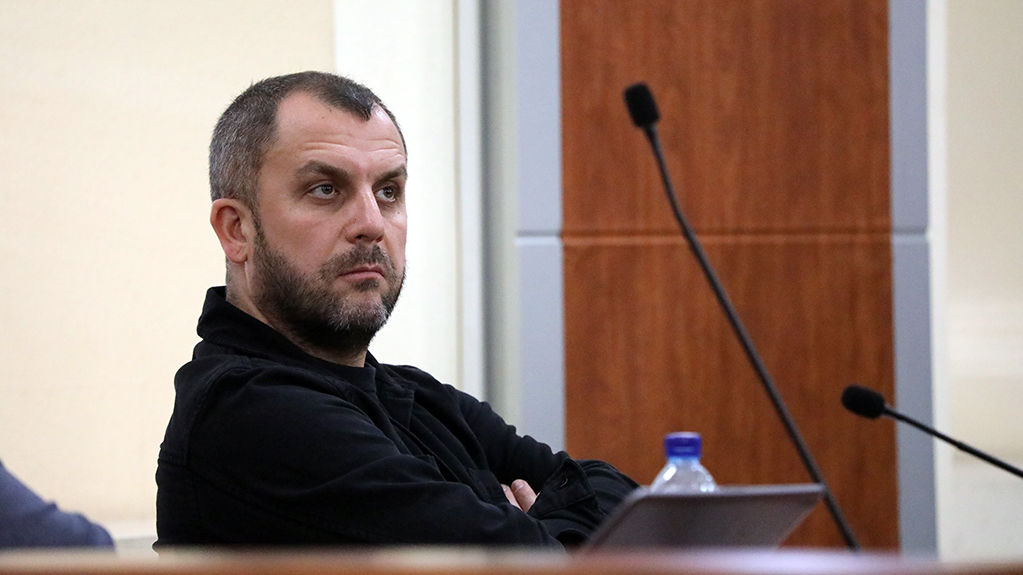The General Prosecutor's Office has acknowledged Gela Mtivlishvili, the editor-in-chief of Mtis Ambebi/Georgian News, as a victim in a case involving his arrest by the police, illegal interference in journalistic activities, and physical violence. This case is under investigation under Articles 154-1 and 333-3b of the Criminal Code.
News
On January 23, 2024, Ministry of Internal Affairs employees arrested Gela Mtivlishvili, charging him with disobedience to a lawful police request. The journalist had arrived at 1 Kekelidze Street in Tbilisi to cover the Khatiashvili family's eviction process when he was arrested.
As Gela Mtivlishvili says, after his arrest, employees of the Ministry of Internal Affairs physically abused and strangled him in the police car. His freedom was restricted for six hours, after which he was released on his recognizance.
During the January 25 court session, the Ministry of Internal Affairs submitted as evidence a video taken during the Khatiashvili family's eviction on Kekelidze Street. However, Gela Mtivlishvili was not present on Kekelidze Street at that time. Judge Nino Shcherbakov accepted the false testimony of one of the arresting police officers, Anri Pkhakadze.
At the court session, the policeman testified that Mtivlishvili was cursing their mother, loudly calling them slaves, and trying to take the detained person away from the four policemen by force.
The Ministry of Internal Affairs could not present any records to the court confirming Mtivlishvili's alleged violation of the law, which would have been captured by a camera or video surveillance system on Kekelidze Street. Instead, the journalist's lawyers, Mariam Pataridze and Vladimer Kutateladze, presented a continuous video taken by the journalist himself on his phone. The video showed that Mtivlishvili had no verbal communication and only physical contact with the policemen. He was 3-4 meters away from them, did not say anything, and was only recording the arrest of one participant during the event. Additionally, an eyewitness invited by the journalist's lawyers confirmed to the court that Mtivlishvili had no contact with the policemen at all and was suddenly arrested and taken away.
Despite this, Judge Nino Shcherbakov, known for his biased decisions against journalists and civil activists and favoring the government, recognized Gela Mtivlishvili as an administrative offender and fined him 2000 GEL. The journalist appealed the decision to the appeals court, but the higher court upheld the original decision.
On the day of his arrest, the journalist reported the illegal detention, obstruction of journalistic activity, and physical violence to the Special Investigation Service. The investigation obtained a video recording from the surveillance system of a currency booth located on Kekelidze Street, which completely proves Mtivlishvili's innocence.
A witness, who was also arrested and was in the police car with Mtivlishvili, confirmed to the Special Investigation Service that the policemen physically assaulted the journalist.
Five months after the investigation began, the General Prosecutor's Office recognized Gela Mtivlishvili as a victim.
Gela Mtivlishvili demands the dismissal and criminal prosecution of the four police officers who illegally detained him, interfered with his journalistic activities, and physically assaulted him in the police car. Mtivlishvili is suing the policemen at the prosecutor's office for giving false testimony to the court. The journalist considers the decisions of both instances to fine him illegal, although such decisions are no longer appealable to the Supreme Court.
In the coming days, with the help of the Center for Social Justice, Gela Mtivlishvili will file a lawsuit with the European Court of Human Rights.
Mtivlishvili has also appealed the legality of his arrest to the Ministry of Internal Affairs, but the Ministry has not yet made a decision.
The journalist attributes his illegal arrest and the aggression shown by the policemen to hateful statements made by high-ranking government officials following the publication of a journalistic investigation on the Shovi tragedy, which he believes encouraged retaliation.
On May 14, during a peaceful demonstration in Tbilisi against the Russian law on so-called foreign agents, members of the special task force and employees of the special tasks department chanted Gela Mtivlishvili's name in an insulting and humiliating context, while making physical gestures at each other. At that time, the journalist was performing his professional duties on Rustaveli Avenue.















